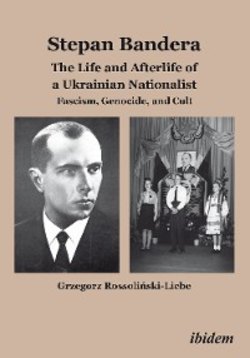Читать книгу Stepan Bandera: The Life and Afterlife of a Ukrainian Fascist - Grzegorz Rossoliński-Liebe - Страница 23
The Beginnings of Ukrainian “Heroic Modernity”
ОглавлениеUkrainian heroic modernity found expression for the first time in the writings of the nationalist extremist Mykola Mikhnovs’kyi (1873–1924), although it derives from the thoughts of such activists as Mykhailo Hrushevs’kyi, Mykhailo Drahomanov, and Ivan Franko. The most influential of these was Hrushevs’kyi, a historian and politician. In the nineteenth century, thinkers such as Georg Wilhelm Friedrich Hegel and Friedrich Engels elaborated on the popular problem of “historical” and “non-historical” nations, to which Hrushevs’kyi responded. Starting from ancient times, Hrushevs’kyi rewrote the history of the Eastern Slavs, displaying bias in favor of the Ukrainian national movement and regarding the Russian and Polish national movements with disfavor. In his voluminous History of Ukraine-Rus’, he separated Ukrainian history from Russian history, claiming that the Ukrainian people had ancient origins. He thereby “resolved” the problem of the “non-historical” Ukrainian people, making it as historical and as rich in tradition as the Polish and Russian peoples. This was one of the most significant late nineteenth-century “academic” contributions to the creation of a national Ukrainian identity.[141]
In his historical writings, Hrushevs’kyi did not insist that the Slavs or Ukrainians were a pure race or had to be viewed as a race. Nevertheless he used the term “race” in the context of anthropology. Writing about the ancient peoples living in the territory of contemporary Ukraine, he mentioned “dolichocephalic” (long-headed) and “brachycephalic” (short-headed) types of people inhabiting the Ukrainian territories in ancient times. He argued that “the Slavs of today are predominantly short-headed” but racially not uniform. The brachycephalic type “is still the dominant type among Ukrainians, but among the Poles and Russians this type vies with the mesaticephalic [medium headed], with a significant admixture of the dolichocephalic.”[142] Looking for the origins of the Ukrainian people among ancient peoples, Hrushevs’kyi concluded that the “Ukrainian tribes” originated from the Antes: “The Antes were almost certainly the ancestors of the Ukrainian tribes.”[143] While analyzing ancient and medieval descriptions of people living at that time in the Ukrainian territories, he pondered about the ideal type of a historical Ukrainian and wrote that Ukrainians were “blond-haired, ruddy-skinned, and tall” and “very dirty” people.[144]
Mikhnovs’kyi, much more radical than Hrushevs’kyi, was the pioneer of extreme Ukrainian nationalism. He lived in Russian Ukraine, mainly in Kharkiv. Because he died in 1924 he did not come into contact with the radical Ukrainian nationalists from the UVO or OUN, but his writings inspired the younger generation.[145] Mikhnovs’kyi politicized the ethnicity of Ukrainians and demanded a “Ukraine for Ukrainians” (Ukraїna dlia ukraїntsiv). He might have been inspired by Hrushevs’kyi’s historization of contemporary Ukrainians and by contemporary European discourses that combined nationalism with racism. Although Mikhnovs’kyi’s concept of ethnicity was based on language, his main aim was a biological and racial marking of the Ukrainian territories or the “living space” of the Ukrainians. He claimed the territory “from the Carpathian Mountains to the Caucasus” for a Ukrainian state without foes. By “foes” Mikhnovs’kyi meant “Russians, Poles, Magyars, Romanians, and Jews … as long as they rule over us and exploit us.”[146]
Mikhnovs’kyi went so far in his ethno-biological concept as to demand, in one of “The Ten Commandments of the UNP,” which he wrote for the Ukrainian National Party (Ukraїns’ka Narodna Partia, UNP), cofounded by him in 1904: “Do not marry a foreign woman because your children will be your enemies, do not be on friendly terms with the enemies of our nation, because you make them stronger and braver, do not deal with our oppressors, because you will be a traitor.”[147]
Mikhnovs’kyi’s concept of Ukraine was directed not only against people who might be considered to be foreigners but also against the majority of Ukrainians, who spoke Russian or a dialect that was neither Russian nor Ukrainian, or who were contaminated through marriage or friendship with a non-Ukrainian. This was the case of many Ukrainians after centuries of coexistence with Poles, Russians, Jews, and other ethnic groups. It was also not a political or cultural program with which the nationally non-conscious Ukrainians could have been transformed through education into nationally conscious Ukrainians. It was rather a social Darwinist concept based on the assumption that there exists a Ukrainian race, which must struggle for its survival against Russians, Poles, Jews, and other non-Ukrainian inhabitants of Ukrainian territories. Mikhnovs’kyi understood this concept as the historical destiny of the Ukrainian people and stressed that there was no alternative: “Either we will win in the fight or we will die.”[148] This early Ukrainian extremist also demanded: “Ukraine for Ukrainians, and as long as even one alien enemy remains on our territory, we are not allowed to lay down our arms. And we should remember that glory and victory are the destiny of fighters for the national cause.”[149]
